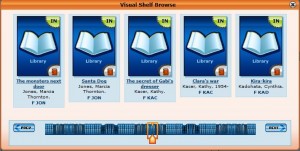Commentary 1: On Virtual Libraries
I was quietly amused upon discovering the “visual shelf” in the Library Catalogue section of my new school’s website, especially as this coincided with the readings on virtual libraries. Aside from looking up books using a standard search of title, author, or topic, students and staff can browse the shelves either from the computer or the comfort of their own home, by simply sliding a box along the image of a shelf of books. However, is this a virtual library by any means? It may be designed to appeal to the computer-savvy nature of today’s child, yet the child still needs to move out of the virtual shelf into the actual school library in order to find the information they seek.
A simple definition for a virtual library is “the worldwide collection of online books, journals and articles available on the Internet.” (PCMAG) O’Donnell’s definition is that it is a “vast, ideally universal collection of information and instantaneous access to that information wherever it physically resides.” (O’Donnell) A more complex interpretation, quoted from Kaye Gapen, states that a virtual library is:
the concept of remote access to the contents and services of libraries and other information resources, combining an on-site collection of current and heavily used materials in both print and electronic form, with an electronic network which provides access to, and delivery from, external worldwide library and commercial information and knowledge sources. (Martell)
The simple definition, that of the collection of materials found on the Internet, is exactly that: too simplified. Yet when one uses a search engine on “virtual libraries,” one finds a barrage of results that use this definition of a virtual library, most of them categorized by subject matter or educational institution. The site that claims to be the “WWW Virtual Library” is simply a series of tiered, nested categories that eventually result in several collections of links. (WWWVL) This example is in no way universal in its scope, as it is monitored by a small group of people who determine what should be included and what should not; nor does it even meet the simple definition of being the collection of materials found on the internet.
If a library is to be deemed a virtual library according to O’Donnell, then it should be ideally universal, vast, and accessible instantaneously. O’Donnell himself recognizes that this is a fantasy that has roots at least as far back as “of the first major Greek translation of the Hebrew scriptures, the so-called Septuagint.” (O’Donnell) He goes further to state that the dream of the virtual library has not changed since this time, only that the “technical possibilities” have. (O’Donnell) However, such a library would be impossible to come to full fruition, because of the fact that, as technologies “advance,” the library itself would become obsolete, and a new creation would need to be included. In addition, O’Donnell addresses the problem of the “ever-accumulating geometrically expanding heaps” of information that would accrue if this virtual library included a historical collection of everything from the past along with the current and future knowledge base. (O’Donnell)
Gapen’s definition seems a little more realistic and a little more usable in today’s world. Unlike O’Donnell, her definition allows for a sifting mechanism of sorts in that her virtual library is limited to “current and heavily used materials.” (Martell) However, who determines what materials will be heavily used? In other words, who determines what will be in this virtual library? Gapen herself describes the virtual library as a “library metaphor for a societal control revolution,” (Martell) implying that some group somewhere is imposing their beliefs on the library consumers.
Needless to say, the meaning of the word virtual itself implies that a virtual library does not physically exist; it just appears to exist. This is a paradox in itself, though; does that mean that the knowledge we gain from a virtual library is not actually knowledge – it just appears to be knowledge? Perhaps the term virtual in the realm of academic information in a world of electronic technology needs to be challenged, as the answer to that question is most obviously “No.”
The current state of the Internet exacerbates the problems both O’Donnell’s and Gapen’s definitions of the virtual library in the sense that there is an overabundance of information and, as yet, no effective way of accessing accurate information quickly and efficiently. It is by far much easier and faster to find information than by the previous methods of the past, yet it is still far from perfect, and as O’Donnell suggests, once we get close to the ideal virtual library, new technology will be in place that will make that ideal obsolete.
Works Cited
Martell, C. (1999). Reaching into the Mist for the Elusive “Virtual” Thing. Journal of Academic Librarianship, 25(2), 132. http://search.ebscohost.com
O’Donnell, J. J. (1994). The virtual library: an idea whose time has passed. Proceedings of the Third Symposium on Gateways, Gatekeepers, and Roles in the information Omniverse (Washington, D.C., United States). A. Okerson and D. Mogge, Eds. Association of Research Libraries, Washington, DC, 19-31. http://web.archive.org/web/20070204034556/http://ccat.sas.upenn.edu/jod/virtual.html
PCMAG.com. Retrieved October 2, 2009, from http://www.pcmag.com/encyclopedia_term/0,2542,t=virtual+library&i=53926,00.asp
The World Wide Web Virtual Library. Retrieved October 2, 2009, from http://vlib.org/



1 comment
1 Clare Roche { 11.28.09 at 5:00 pm }
I am grateful for the access I have had to my university’s online library and I cannot imagine how I would have completed my assignments without it. If the next change makes my research easier then I will welcome it, but I hope that online libraries will become less restrictive so that access in the future will be for all and not just for an academic elite.
You must log in to post a comment.